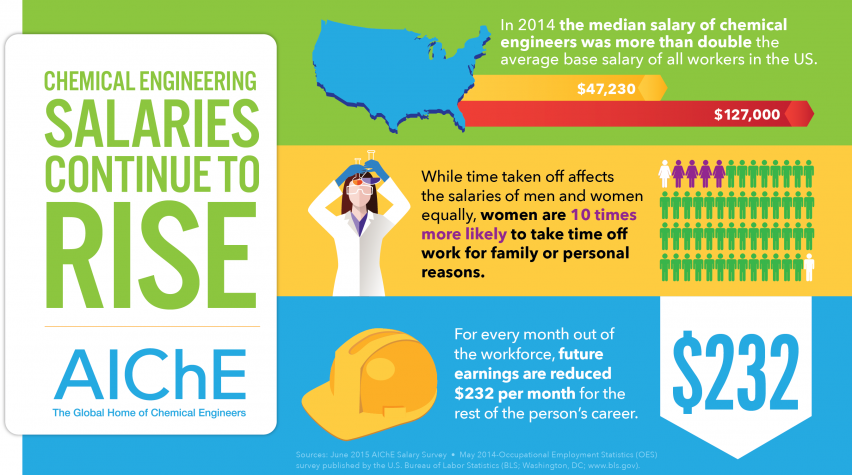
CEP’s biennial salary survey is presented in the June 2015 issue and includes a quantitative analysis of chemical engineering salaries relative to variables such as age, experience, functional area, state, industry, etc. AIChE members can access an expanded version here.
Experience and time taken off
The median annual salary of survey respondents increased from the median reported in 2013. Work experience and time taken off for family reasons show the most significant impacts on salaries.
Survey results — not surprisingly — indicated that respondent salaries increased with experience. When earnings were evaluated as a function of experience and gender, salaries began to diverge. Less-experienced male and female respondents reported similar wages, if not slightly higher for female engineers. However, more-experienced male engineers reported higher salaries than their similarly experienced female counterparts.
The discrepancy could be due to time taken off work for family reasons, which is ten times more common for females than males, according to survey data. This suggests that women still assume many domestic responsibilities, despite their prevalence in the professional world.
However, the difference between salaries for males and females who took time out of the workforce was not statistically significant. For every month out of the workforce, future earnings are reduced by $232 per month for the rest of the person’s career, regardless of gender, a sum that confirms the long-term impact time off can have on a career.
The future
The U.S. Bureau of Labor Statistics (BLS) expects employment for chemical engineers to grow by 4% over the next ten years — slower than the expected growth for all occupations (11%) and growth for engineers in general (9%). The BLS reports that growth will be stemmed by a decline in employment in manufacturing sectors, which includes chemical manufacturing.
Growth may be slow, but salaries remain high. According to the BLS, chemical engineers continue to earn more than the national average ($47,230) and engineers in general ($93,630), with a mean salary of $103,590.



Comments
It's sad that time taken off, presumably for maternity leave in most cases, would affect future earnings that much. It would be interesting to compare that $232 statistic for chemical engineers' salaries to other professions. Time off for a multitude of reasons is so important and I find it infuriating that women are required in most cases to "go on short-term disability" when they are on maternity leave. Many other developed countries allow for ample time off at almost full salary for both maternity and paternity leave.
Very enjoyable article. Are those potential earnings less because one won't get a raise, or because one won't get a promotion? With respect to a decrease in potential earnings due to time off from work, the article does state: "...the difference between salaries for males and females who took time out of the workforce was not statistically significant." For me, this indicates that it is not gender-based, which is counter-intuitive; I would otherwise expect this to be a function of gender given the difference in earnings we see in the survey between males and females with a lot of professional experience. Given this, I wonder if time away from work also affects one's potential for gaining increased levels of supervision or much higher individual-contributor positions. This would seem to make sense, but I don't have the data. It's those higher-supervisory positions where we see the greatest difference in salaries from the survey.
Hi Justin, The survey results do not indicate the source (no raise or no promotion) of the reduction in pay . As for your second assertion, the likely reason the more-experience women earn less than the similarly experience men is because more women tend to take time off (a ration of 10:1), which negatively affects their earning. For men and women who both take time off, they are affected similarly, indicating the difference is not a result of gender bias. However, perhaps the bias arises because women typically need to take time off for maternity leave. Leaving them with no choice but to accept the repercussions.
As a new mom of a one year old and a working professional this type of data can be upsetting because as a woman you physically MUST take the time away from work to have the baby, unlike our male counterparts who may take a week or two. These trends just reemphasize the statements made in the book "Lean In" that you must work your butt off right until that baby is about to be born, and not check-out too far in advace. This will help show how critical you are to your company so you don't get forgotten on projects or promotions while you are gone for our allotted 12 weeks (yes- this is significantly less than any other country and babies hardly have all their needed vaccines at this point to go to daycare).